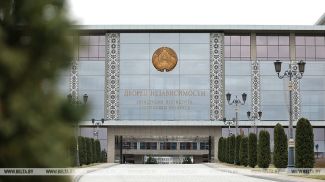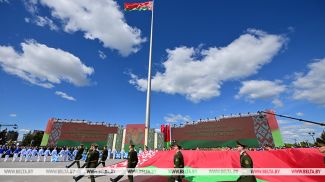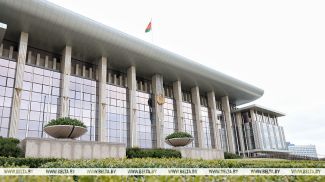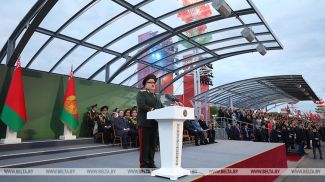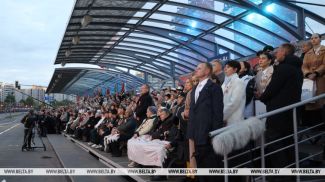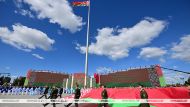SOCHI, 7 February (BelTA) – Belarus President Aleksandr Lukashenko is set to hold talks with his Russian counterpart Vladimir Putin in Krasnaya Polyana, Sochi on 7 February. The Belarusian head of state arrived in Sochi on 6 February.
The heads of state will discuss a broad range of issues of the Belarus-Russia cooperation agenda, the press service of the Belarusian president informed. The Kremlin press service said that the two presidents are to discuss bilateral cooperation, including in the context of integration processes within the Union State.
It should be noted that Presidents Aleksandr Lukashenko and Vladimir Putin meet quite often both in the bilateral format and in integration platforms. When necessary, they convene to discuss current issues. Recently, the media interest in the talks between the two heads of state has increased due to the ongoing problems in bilateral relations.
In 2019, the governments of Belarus and Russia developed an integration package to include 30 road maps on cooperation in various areas. As of early 2020 issues important for Belarus, including those lying outside the integration agenda were not settled. The main differences are related to the prices and supplies of Russian hydrocarbons. This also includes the tax maneuver in the Russian oil industry, due to which Belarus lost some $330 million in 2019 alone. Belarus' budget losses made up $130 million, those for oil refineries - almost $200 million.
The issue concerning compensation for tainted Russian oil delivered in April through the Druzhba pipeline has not yet been settled as well. Both Belarusian oil refineries – OAO Naftan and Mozyr Oil Refinery – were forced to reduce their workload and suffered financial losses. Damage was also caused to the pipeline system.
It has been happening regularly for 13 years
BelTA reported earlier that Belarus President Aleksandr Lukashenko called a government conference on 6 February ahead of his visit to the Russian city of Sochi. “We've gathered here in order to discuss a number of measures concerning the fulfillment of forecast targets and – there is no need to conceal anything – overcome the negative trends emerging in our economy due to the recent events in the world and, first of all, in relations with Russia,” the head of state said. “These are not only the matters specialists are concerned about. Everyone is aware of them: deliveries of oil and natural gas, food wars, which, unfortunately, we have grown accustomed to recently.”
Aleksandr Lukashenko reminded that once again Belarus had run into differences of opinion about energy resources with its closest partner – Russia. It has been happening regularly for 13 years despite mutual commitments, he remarked. “Although when we were signing them, we were given solid assurances. For instance, the Russian government has undertaken to supply 24 million tonnes of oil to Belarus this year or 2 million tonnes every month. As little as 500,000 tonnes or one fourth was supplied in January,” the head of state said.
In January 2020, Belarus was working on oil supplies with the Russian group of companies Safmar at a price without a premium, while other Russian suppliers demanded an additional premium to the oil price. “$15-16 per tonne. If you multiply it by 24 million tonnes, you will get a hefty sum of money,” the head of state stated.
Aleksandr Lukashenko also presented his view on the price for the natural gas Belarus buys. “When we sold them our Beltransgaz pipeline, they promised that the price Belarus pays will be equalized with Russian ones,” the president said. The Belarusian head of state emphasized the importance of equal competitive conditions, not the price.
At the previous many-hour talks with Vlaidmir Putin in Sochi on 7 December, Aleksandr Lukashenko said: “The main thing is to have equal conditions. We do not ask for cheap gas and cheap oil. We are ready to buy gas for $200 and to buy oil for more than $63 per barrel.
Currently the price of Russian gas for Belarus is $127 per 1,000 cubic meters. The parties should have agreed on a new contract and the price in summer 2019. Yet, the parties were able to come to some sort of an agreement on the New Year Eve and only for January and February 2020 (Belarus is getting natural gas at prices on par with last year's level).
Alternative oil deliveries options
The situation with energy supplies forced Belarus to look for alternative sources. Aleksandr Lukashenko gave the appropriate instructions to the government. A variety of supply options are being considered, including through pipeline and railroad transport. The topic has already been publicly discussed with high officials of the neighboring transit countries - Latvian Prime Minister Krisjanis Karins and Lithuanian Minister of Foreign Affairs Linas Linkevicius during their recent visits to Belarus.
Negotiations are also underway with potential suppliers, for example, with Kazakhstan. The Belarusian president stressed that working with alternative oil supplies is not a bluff, and spoke about possible routes. One of them is via ports on the Baltic Sea. A batch of Norwegian oil has already been purchased. Another Baltic route is from Gdansk through one of the parts of the Druzhba oil pipeline, which will have to be launched in reverse mode. “I told Putin directly: at the first stage, if we agree with the Poles, we will supply oil through one of the three pipes in reverse,” said the president in late January.
The third option, and it has already been tried before, is the supplies from the Black Sea through Ukraine.
“The fourth option is Russia. We are not giving up on this oil. But in this way we will diversify our supplies,” said the president.
Earlier it was also reported about the readiness of some major players in the oil market to supply the appropriate raw materials to Belarus. Among them are partners in the Middle East and even the USA. “Our energy producers stand ready to deliver 100% of the oil you need at competitive prices. We are the biggest energy producer in the world and all you have to do is call us,” U.S. Secretary of State Michael Pompeo told Aleksandr Lukashenko in Minsk on 1 February.
In general, the President sets the task to strive for 30-40% of the required volumes of oil to be purchased in Russia and about a third to be imported from the Baltic States and through Ukraine.
The head of state said: “We have to aim to get 30-40% of oil from the Russian Federation. We should import about 30% from the Baltic states and about 30% via Ukraine.”
Some moment of truth has come
BelTA reported earlier that Belarus President Aleksandr Lukashenko announced his upcoming meeting with Vladimir Putin as he spoke to reporters on 4 February. “It is highly likely that I will meet with President Putin on 7 February. I believe, and I will tell him openly about it, that some moment of truth has come. We have built these good relations [between Belarus and Russia]. We were the architects of these relations. Are we the ones to break them at the end of our political career? We cannot be here forever. The question is what legacy we will leave,” Aleksandr Lukashenko said.
He emphasized that Belarus seeks most friendly relations with the brotherly nation but pointed to a number of issues in the interstate cooperation. They mostly pertain to prices for and delivery terms of Russian gas and oil. Aleksandr Lukashenko also pointed to a significant imbalance in Belarus-Russia trade. “We are running a $9 billion trade deficit with Russia. In other words, they sell here $9 billion more worth of goods than they buy. Who provides for whom?” the president noted.
The Belarusian head of state called for constructive cooperation. “We need to straighten relations. We need to pass to a new generation what we have achieved [in relations with Russia in the previous years] in a decent way,” Aleksandr Lukashenko concluded.




